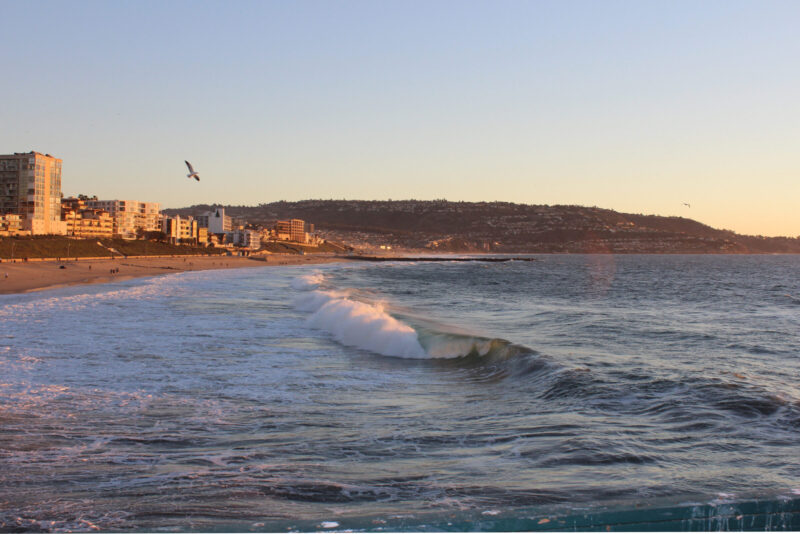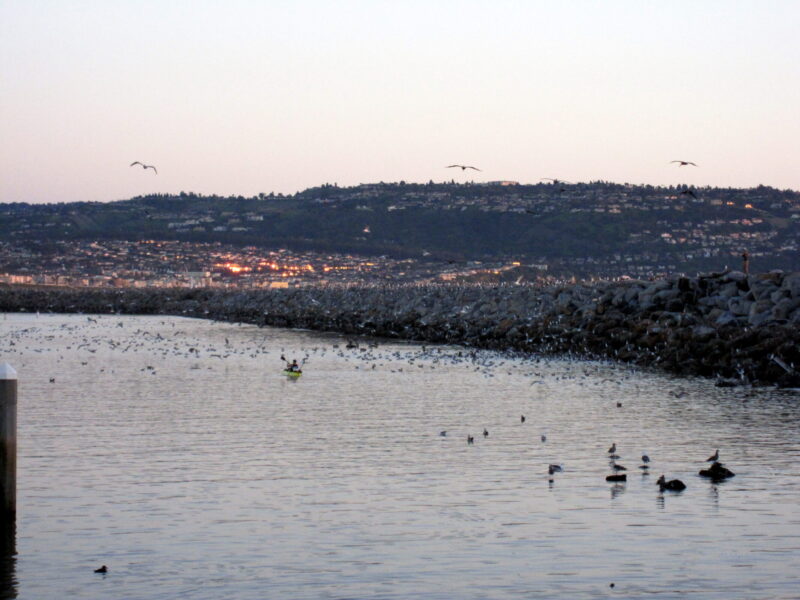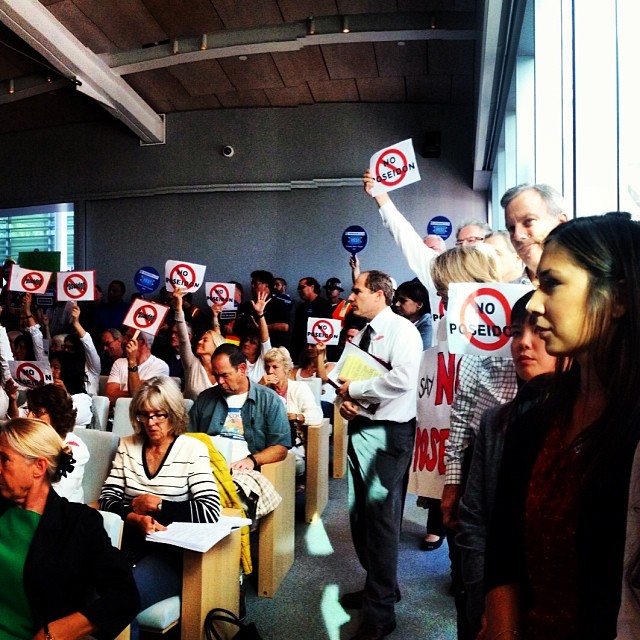Tides of Change Thanks to Big Decisions in 2021 for LA’s Coast

UPDATE 3/1/2022
Another ocean water desalination plant has been proposed for construction in Huntington Beach. This project has also been opposed by the environmental community and by the public for years. Poseidon will be applying for a coastal development permit to build their ocean water desalination plant with the CA Coastal Commission. This meeting was originally scheduled for Thursday, March 17, 2022. However, the meeting has been postponed, and no new date has been announced yet. Keep an eye out – we’ll let you know when it gets rescheduled.
UPDATE 2/10/2022
Two critical decisions were made in 2021 to protect LA’s coastal waters from the negative impacts of large-scale ocean water pumping. All too often, we see exemptions, extensions, and approvals for projects that threaten our coastal waters, but the tides may be turning!
Previous extension approvals allowed the Redondo Beach Once Through Cooling Facility to avoid fees associated with years of water quality violations; a trend that ended with this Regional Board Vote. And, LA County’s West Basin Board of Directors voted to terminate a massive ocean desalination project proposed for El Segundo in a shocking step forward for protecting coastal waters.
Are these victories signs of systemic change? And what can Californians do to keep this trend of transformation going while combating large-scale industrial interests that are dangerous to our environment and public health?
Let’s jump into what we mean by ‘ocean water pumping’ and how these two coastal project decisions uphold the Clean Water Act, which is celebrating its 50th Anniversary this year.
Protecting the Santa Monica Bay from Harmful Industrial Water Pumping
Industrial water use includes the large-scale pumping (or “intake”) of ocean water and it has severe negative impacts on the health of our coastal waters. The intake of ocean water threatens sea life with impingement (being sucked up against an intake pipe) and entrainment (being sucked up into an intake pipe), both of which can cause serious injury or death. The Clean Water Act of 1972, celebrating its 50th anniversary this year, requires the Environmental Protection Agency to regulate this pumping to minimize those negative impacts.
At the end of 2021, two critical decisions were made right here in Los Angeles, that support these Clean Water Act regulations by limiting industrial ocean water intake and holding those who continue to use it accountable.
Rejection of Extension Request from the Redondo Beach AES Power Plant and Once-Through Cooling Facility

Seabirds and Pinnipeds are just a few species that can be affected by the Once-Through Cooling process used in locations like Redondo Beach (King Harbor / Dana Murry )
Once-Through Cooling (OTC) is a process used by power generating facilities to cool down generators using water. Most of these facilities, especially in California, are located along the coast, positioned to use ocean water. But this kind of large-scale ocean water intake is what threatens sea life with impingement and entrainment. After the water is used, it is usually released back into the ocean, but oftentimes at a higher temperature and with pollutants from the equipment, causing possible water quality violations and concerns for coastal wildlife.
OTC was first recognized as a threat to California’s fisheries, estuaries, bays, and coastal waters in 2005, leading to the approval of a Statewide OTC Policy in 2010. Heal the Bay was one of many stakeholders that worked together to craft the requirements of the OTC Policy. One major compromise was the long time schedule, giving all OTC facilities 10+ years to either shut down or transition away from OTC operations. Now that we are finally approaching those deadlines, we are seeing many of these OTC facilities asking for extensions beyond the original 10+ year grace period.
Over the last two years, the Redondo Beach OTC Facility has requested two separate extensions for operation. Despite opposition from environmental groups and Redondo Beach Mayor Brand, the State Board approved both, allowing the Redondo Beach OTC Facility to continue operations through December 31, 2023. The Redondo Beach Facility then requested an extension (referred to as a Time Schedule Order) from the Regional Water Quality Control Board to essentially waive any fees for water quality violations of the OTC wastewater they release during this time.
On December 9, 2021, the Regional Water Board voted 3-1 to deny this request after hearing clear opposition from NGOs like Heal the Bay, as well as from representatives from the City of Redondo Beach. This was the first time in years that the Regional Board has denied any Time Schedule Order request. The Redondo Beach Facility is still allowed to operate, but they are no longer exempt from fines associated with their contaminated OTC wastewater discharges. If the vote had gone the other way, it would have provided a clear and easy path for additional operational extensions. This critical decision by the Regional Water Board will help to protect water quality by putting pressure on the Redondo Beach Facility to shut down their OTC operations by the new December 31, 2023 deadline.
Termination of the West Basin Ocean Water Desalination Project
Desalination, or the process of sucking in seawater and removing the salt to convert it to freshwater, might initially seem like a logical way to get more freshwater for Southern California. But ocean water desalination has many negative impacts on the environment, and the truth is that we do not need it. Although Southern California does face consistent drought conditions, we can source enough water locally to support all of our water needs without ocean water desalination by focusing on smart water practices like water conservation, recycling efforts, and stormwater capture. One of the myriad problems with desalination is the ocean water intake process, which poses the same impingement and entrainment threat as OTC operations.
The West Basin Municipal Water District had proposed an ocean water desalination plant in El Segundo, intending to reuse decommissioned OTC piping to intake ocean water. This project has been hotly contested for decades, with strong opposition from the environmental community (including Heal the Bay) as well as from the public, because it is the most expensive and energy-intensive way to obtain fresh water and simply does not make sense for Southern California.
At a meeting of the West Basin Board of Directors on December 23, 2021, the Board voted 3-2 to terminate the ocean water desalination project, after hearing from 25 members of the public speaking in opposition to the project. Many factors contributed to this decision including a report from West Basin proving that ocean water desalination is not needed to meet water supply demands for LA. But a final vote from Board Member Houston, quoting the fact that there is no longer public support for the project, broke the tie.
Upholding the Clean Water Act to protect our water, ecosystems, and communities
West Basin’s decision to terminate its ocean water desalination project stopped new industrial intake from affecting our coastal waters and stopped an unnecessary, expensive, and energy-intensive system from being built. The Regional Water Board’s decision to deny the Redondo Beach Facility Time Schedule Order provides extra incentive for the Facility to stop intake operations and to shut down the inefficient, fossil fuel burning Redondo Beach Facility altogether. Both decisions protect coastal waters, ecosystems, and communities in Santa Monica Bay and uphold the Clean Water Act by minimizing the negative impacts of industrial intakes.
Save the Date to Advocate Against Ocean Water Desalination

Public interest and intervention played a big part in both outcomes, just as this huge turnout did for the decision on a desalination plant proposal for Huntington Beach at Coastal Commission meeting in 2013.
Both decisions were swayed by public demand for safe and clean water, but we cannot stop here. To shift the tides so that public and environmental protection becomes the standard, we need more decisions like these. You can help to advocate against ocean water desalination and demand safe and clean water for all.
Another ocean water desalination plant has been proposed for construction in Huntington Beach. This project has also been opposed by the environmental community and by the public for years. Poseidon will be applying for a coastal development permit to build their ocean water desalination plant with the CA Coastal Commission on Thursday, March 17, 2022. Check out this Fact Sheet from the CA Coastal Commission for more information or engage with our partners at Orange County Coastkeeper to advocate against ocean water desalination.
UPDATED NOTE: As of February 28, 2022 the March 17, 2022 meeting has been postponed and no new date has been announced.


